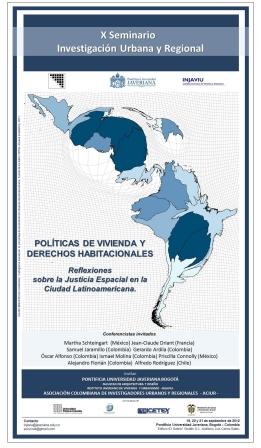Resumen
¿Cómo zanjar la distancia existente entre la formalidad constitucional y legal [políticas públicas] y la superación real de pobreza en comunidades urbanas de países tercermundistas?. Los proyectos de renovación urbana, pretendiendo no sólo generar suelo urbano para vivienda de interés prioritario e interés social, sino reducir la pobreza, terminan interviniendo el espacio, pero manteniendo y, aun profundizando las condiciones de pobreza e infelicidad de las comunidades humanas afectadas. Las altas tasas de pobreza y pobreza extrema en Colombia se expresan en problemas por los cuales se está esperando soluciones desde hace decenios, particularmente acceso a vivienda propia digna, mientras los índices de desigualdad en el ingreso, desempleo y empleo precario crecen. Este trabajo centrado en el seguimiento de un proyecto de renovación urbana en la ciudad de Manizales, muestra cómo políticas públicas mal diseñadas y peor ejecutadas, sin participación ciudadana en su concepción, generan más pobreza, desigualdad e infelicidad para los más desprotegidos.
Esta revista científica se encuentra registrada bajo la licencia Creative Commons Reconocimiento 4.0 Internacional. Por lo tanto, esta obra se puede reproducir, distribuir y comunicar públicamente en formato digital, siempre que se reconozca el nombre de los autores y a la Pontificia Universidad Javeriana. Se permite citar, adaptar, transformar, autoarchivar, republicar y crear a partir del material, para cualquier finalidad (incluso comercial), siempre que se reconozca adecuadamente la autoría, se proporcione un enlace a la obra original y se indique si se han realizado cambios. La Pontificia Universidad Javeriana no retiene los derechos sobre las obras publicadas y los contenidos son responsabilidad exclusiva de los autores, quienes conservan sus derechos morales, intelectuales, de privacidad y publicidad.
El aval sobre la intervención de la obra (revisión, corrección de estilo, traducción, diagramación) y su posterior divulgación se otorga mediante una licencia de uso y no a través de una cesión de derechos, lo que representa que la revista y la Pontificia Universidad Javeriana se eximen de cualquier responsabilidad que se pueda derivar de una mala práctica ética por parte de los autores. En consecuencia de la protección brindada por la licencia de uso, la revista no se encuentra en la obligación de publicar retractaciones o modificar la información ya publicada, a no ser que la errata surja del proceso de gestión editorial. La publicación de contenidos en esta revista no representa regalías para los contribuyentes.


